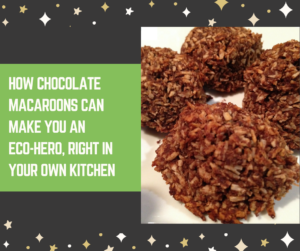
What if the food you eat to stay alive is killing the planet you live on?
More and more, we’re learning that many of the foods we eat are grown, manufactured, packaged and transported in ways that harm the very water, air and land we depend on for survival.
The good news: You can be an eco-hero and right some of those environmental wrongs, right in your own kitchen! The kitchen isn’t just a place for saving your own personal health. It is also offers you hundreds of opportunities to save the planet.
At first blush, almond milk seems like such a benign product–healthy, low-calorie, tasty–and everyone seems to be drinking it! Shortly after resolving to make my own almond milk, however, I began learning about its dark side.
Food Waste and Global Warming Previous posts talked about the enormous amount of pulp left over from making almond milk. Commercial producers reportedly toss it–a huge waste of edible food. What’s more, unless composted, wasted pulp becomes a big contributor to global warming, just like all food waste. (Note, however, that in response to my email, the makers of Almond Breeze state that there is “no left over pulp when making Almond Breeze” due to their unique processing method; good news to me!)
Excessive Water Consumption Growing almonds requires a lot of water–over a gallon for a single almond–a problem made worse by the fact that most almonds are grown in California which is still experiencing one of its worst droughts, despite recent rains.
Honeybee Die Offs California’s almond groves are also blamed for recent honeybee die offs. Huge numbers of bees are imported to the state each spring to pollinate almond groves, but many are dying and the culprit is likely a toxic cocktail of pesticides sprayed on almond trees.
Loss of Valuable Nutrients Although almonds are nutrient packed, the milk is not. That should come as no surprise since very little of the almond makes it into the milk, which is 98% water! This makes it all the worse that the pulp with all those nutrients is wasted!
No doubt you’ve read other articles that villain-ize some of your favorites foods. They’re depressing! You’re left in a no-win trap: Either give up your favorite food or continue eating it, knowing the environmental damage it causes.
Happily, the kitchen offers you some options.
For instance, since learning about the environmental damage caused by almond milk, I’ve been strategizing. For me, almond milk is mostly a vehicle for quenching my post-dinner chocolate craving. I heat up a cup with a little honey, stevia and unsweetened cocoa powder and voila! the resulting hot chocolate is a fast and totally satisfying chocolate fix.
By knowing it’s an easy-to-make chocolate fix that I’m after, the door is opened to lots of alternatives:
- Just making my own almond milk makes it possible to use–instead of waste–the pulp
- Using the pulp for healthy chocolate brownies and macaroons means I can satisfy my chocolate craving half of the time without almond milk
- If I make chocolate chai tea instead of hot chocolate I can get by with only a third of my usual quantity of almond milk
- Finally, I have several other fast but healthy chocolate treats that need no almond milk–if I just get out of my lazy rut and make them!
And so it is, that with a few kitchen skills, some handy recipes, a helpfully stocked pantry and some motivation, I am empowered to make options that keep me healthy as well as the planet. And the kitchen is my friend and ally–the place where I can be an eco-hero, three times a day, seven days a week!
That’s why we call our nonprofit organization The New Kitchen. We want to introduce you to a new way of looking at the kitchen, as a place for saving our own health as well as the health of our planet, communities, families and local economies. Learn more here.
Now check out the preceding post for the Chocolate Almond Macaroon recipe that offers one small option for reducing environmentally harmful food waste and reducing dependence on almond milk.